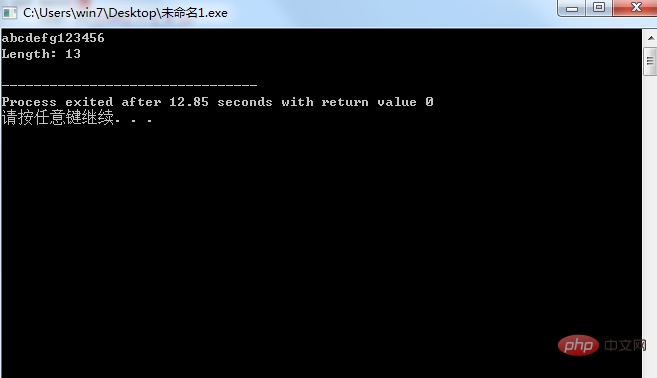 Backend Development
Backend Development
 C#.Net Tutorial
C#.Net Tutorial
 How to find the length of a string in C language and output it
How to find the length of a string in C language and output it
How to find the length of a string in C language and output it
C language method to find the length of a string and output it: first use the strlen() function to calculate the length of the string and assign it to the variable len, the syntax is "len=strlen(string);"; then Use the printf() function to output the length, with the syntax "printf("%d\n",len);".

The operating environment of this tutorial: windows7 system, c99&&Dev-C version 5.11, Dell G3 computer.
In C language, you can use the strlen() function to find the length of a string.
The C language strlen function is used to find the length of a string (how many characters it contains).
strlen() function counts backwards from the beginning of the string until it encounters \0, and then returns the value of the timer. The final statistical string length does not include \0.
Header file: string.h
Syntax/Prototype:
size_t strlen(const char* str);
Parameter str represents the string of required length.
Return value: The length of the string str.
Example: strlen() function finds the length of the string input by the user and outputs it.
#include <stdio.h>
#include <string.h>
int main(){
char str[100] = { 0 };
size_t len;
gets(str);
len = strlen(str);
printf("Length: %d\n", len);
return 0;
}Run results:

Related recommendations: "C Language Video Tutorial"
The above is the detailed content of How to find the length of a string in C language and output it. For more information, please follow other related articles on the PHP Chinese website!

Hot AI Tools

Undresser.AI Undress
AI-powered app for creating realistic nude photos

AI Clothes Remover
Online AI tool for removing clothes from photos.

Undress AI Tool
Undress images for free

Clothoff.io
AI clothes remover

AI Hentai Generator
Generate AI Hentai for free.

Hot Article

Hot Tools

Notepad++7.3.1
Easy-to-use and free code editor

SublimeText3 Chinese version
Chinese version, very easy to use

Zend Studio 13.0.1
Powerful PHP integrated development environment

Dreamweaver CS6
Visual web development tools

SublimeText3 Mac version
God-level code editing software (SublimeText3)

Hot Topics
 The meaning of strlength in c language
Apr 03, 2025 pm 06:18 PM
The meaning of strlength in c language
Apr 03, 2025 pm 06:18 PM
The strlen() function gets the length of the string, excluding the empty character '\0': 1. Calculate the number of characters without empty characters; 2. Iterate over the string until the empty character is found; 3. Return the length of the string, type size_t.
 What does C language char mean?
Apr 03, 2025 pm 05:03 PM
What does C language char mean?
Apr 03, 2025 pm 05:03 PM
char is the data type that stores a single character in C language, occupying 1 byte of memory, with a value range of -128~127, and the default value is '\0' (empty character). It can be used to store and manipulate individual characters, but cannot directly store strings or Unicode characters, and cannot be compared directly with strings.
 What does {0} mean in C language
Apr 03, 2025 pm 05:06 PM
What does {0} mean in C language
Apr 03, 2025 pm 05:06 PM
In C, braces {} are used to initialize the array, and {0} represents a list of initializers containing unique element 0, initializing all elements of the array to 0. Other uses include: structure initialization ({0} initializes all members to 0), and joint initialization ({0} initializes all members to 0).
 What does model mean?
Apr 03, 2025 pm 05:36 PM
What does model mean?
Apr 03, 2025 pm 05:36 PM
In C language, model usually refers to a model or modal, which is used to represent patterns or frameworks of different states or behaviors. Specific usages include: 1. Model class: properties and methods containing specific entities or concepts; 2. Modal window: special windows in the user interface that prevent interaction with other windows; 3. Design pattern: templates for predefined solutions to solve common programming problems; 4. State machine: machines that make decisions based on current state and input.
 What does swap mean in C language
Apr 03, 2025 pm 06:27 PM
What does swap mean in C language
Apr 03, 2025 pm 06:27 PM
In C language, the swap instruction is used to exchange the values of two variables: swap(x, y): swap(x, y): swap the values of x and y can be achieved by using temporary variables or bit operations.
 What does htoc mean in c language
Apr 03, 2025 pm 06:45 PM
What does htoc mean in c language
Apr 03, 2025 pm 06:45 PM
The htoc function converts a hexadecimal string to an integer. It scans the string character by character, multiplies each hexadecimal number by the appropriate power according to its position in the string, and then accumulates it to get the final result.
 What does C language of mean
Apr 03, 2025 pm 06:51 PM
What does C language of mean
Apr 03, 2025 pm 06:51 PM
The of operator points to a member of a structure or union, and is used as expr.member, which is used to access or assign a member's value.
 Concept of c language function
Apr 03, 2025 pm 10:09 PM
Concept of c language function
Apr 03, 2025 pm 10:09 PM
C language functions are reusable code blocks. They receive input, perform operations, and return results, which modularly improves reusability and reduces complexity. The internal mechanism of the function includes parameter passing, function execution, and return values. The entire process involves optimization such as function inline. A good function is written following the principle of single responsibility, small number of parameters, naming specifications, and error handling. Pointers combined with functions can achieve more powerful functions, such as modifying external variable values. Function pointers pass functions as parameters or store addresses, and are used to implement dynamic calls to functions. Understanding function features and techniques is the key to writing efficient, maintainable, and easy to understand C programs.





